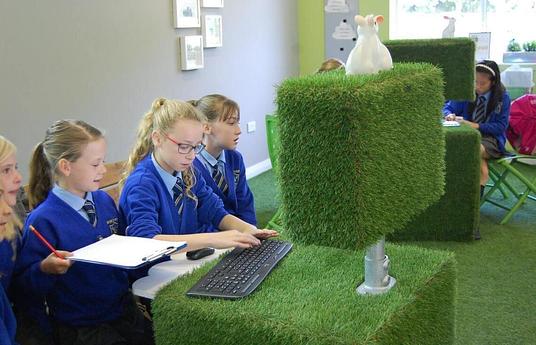We’re constantly sold the idea that technology is coming for all of us. It’s going to take our jobs, robots are going to become our romantic rivals and when it comes to education – when kids can google anything they want to know – why would we need teachers?
Who knows why we created this terrifying sci-fi future for ourselves. Sure it’s fun to watch it play out in dark shows like Black Mirror and Humans, but our reality actually shows that humans have an ability to persevere and remain valuable even though predictions of our future have always tended to be much more negative. There was a time when the invention of the atomic bomb was what dominated our concerns over our own destruction. But here we are, decades later, and we haven’t descended into atomic war. Similarly, we shouldn’t write ourselves out of the story just yet, there’s still time to make technology work for us rather than overtake us.
The idea that there will be a new relationship for teachers to embody due to the rise of technology is almost as old as technology itself, but it hasn’t materialized. If anything, technology serves to show how important human interaction is. As Johan Brand, Co-Founder of Kahoot!, told us, ‘very good products are very human’ and ‘digitilization is a way of amplifying the human side of us.’ When technology is at its best it serves human needs, rather than dominating them.
As a whole society we need to be having a conversation about technology. For too long we’ve allowed for technology to happen to us, rather than affecting its existence.
"
Teachers are still needed. Computers can’t encourage, motivate and inspire children the way a good teacher can. When we all think back on our education to date, no matter our age, it’s always a person who stands out who helped us along the way – not a piece of technology.
That’s not to say technology isn’t important or isn’t valuable to a good education. Removing technology altogether is just confusing for students these days, who are used to having phones, tablets, laptops – all kinds of devices outside of school. To therefore not have them in the classroom is making the gap between school and the real world widen and does nothing to prepare them for life after school.
Just like good teachers, good technology can enhance the educational experience. It’s all about finding the technology that’s worth the effort and price tag. Our Tech Edit is a good place to start, where we’ve carefully researched and chosen some educational technologies which are genuinely impactful and worth investigating.
Because technology is interwoven into our daily lives – and as such should be woven into the fabric of schools – the most important thing is to make sure teachers are digitally literate. This would involve updating teacher training programmes to make sure the new generation of teachers are ready to go whilst making sure that already qualified teachers have access to adequate professional development opportunities so they can update their skills and be the best teachers they can be.
We often think that kids are all over technology and don't share similar concerns with us about the negative implications of it – but that assumption is entirely wrong.
"
Additionally, if we are going to give teachers extra responsibility, such as incorporating new technologies into the classroom, we need to give them extra support. If every child or groups of children in the classroom have devices to use in class exercises, there needs to be additional teaching support to help out when children have questions or to make sure they’re utilizing the technology for the intended learning outcome. Again, it’s also important to stress the value of adequate training opportunities for teachers to use technology so they can feel confident in their classrooms as well as find joy in learning new ways to teach!
We often think that kids are all over technology and don’t share similar concerns with us about the negative implications of it – but that assumption is entirely wrong. Kids today don’t think the online world is fair. They want to have more agency and control over what happens to them online. They actually care more than we would assume, but unfortunately this rarely comes out in conversation as we don’t have the right approach or provide them with adequate language to talk about it.
When we think about technology in education we usually think about computational training and perhaps coding if we’re feeling adventurous, but this misses out some of the most major aspects of technology that kids need to be taught. Online etiquette and computer literacy are two major pillars of what it is to be a technologically engaged citizen.
We shouldn’t write ourselves out of the story just yet, there’s still time to make technology work for us rather than overtake us
"
We need to make sure kids know how to present themselves online, communicate and how to incorporate technology into their lives in a way that suits them – and how to make sure it doesn’t take over and damage their mental health. Visual literacy is also incredibly important so that children know how to interpret videos online, to question the source to know if it’s credible, to be aware that even videos can be manipulated and to understand how videos can be used effectively in communication.
We also need to let kids know not to agonize over the prospect of technology making some jobs redundant – after all, jobs have consistently become redundant over time whilst others have come into being – this concept isn’t new. Instead we should educate children in a way that encourages them to embrace and seize the opportunities that tech presents. Reframing the conversation this way can inspire and motivate rather than adding to poor mental health concerns.
As a whole society we need to be having a conversation about technology. For too long we’ve allowed for technology to happen to us, rather than affecting its existence. Instead of pining for the good ol’ days before the internet, we need to realise we can’t go back – and neither should we want to. Technology presents many exciting opportunities for all of us – including invigorating learning.
Children’s safety online is also imperative and should be included in the conversation. Technology companies are letting children down by not standing up for their rights. Social media, though it may have basic things in place to protect young children, should have more advanced boundaries in place to protect children depending on their age. Those of us who grew up in the dawning of the internet have stories of cyberbullying, being exposed to explicit content or being contacted by a stranger, all of which can have dangerous consequences. The fact that all of these could still possibly happen to children today shows how little we’ve advanced technology with our children’s rights in mind.
Technology companies need to up their game and take responsibility for all of our children’s rights.
"
Instead of framing the conversation as ‘internet safety’, technology companies need to own it and develop technology that upholds children’s rights, fit social media for certain age groups and take into consideration the needs of children. It’s not hard to wonder how many children have been included in the market-testing of new products – or whether they even come up in conversation at all (and not as an afterthought). Technology companies need to up their game and take responsibility for all of our children’s rights.
Beeban Kidron, Co-Founder of FilmClub, simplified it best at Bett 2018, “We have to design the world we want.” and that’s absolutely right. Society should have a voice over what technology is developed to make sure it is suiting our needs and betters us as a whole rather than working as a detriment. Good technology can create a better world and, crucially, a better way to educate.
Check out The Tech Edit where we’ve rounded up some of our favourite tech innovations to bring the classroom up to speed.




